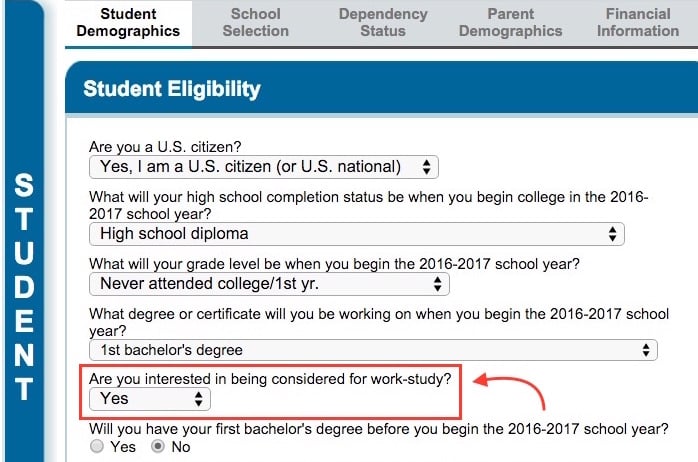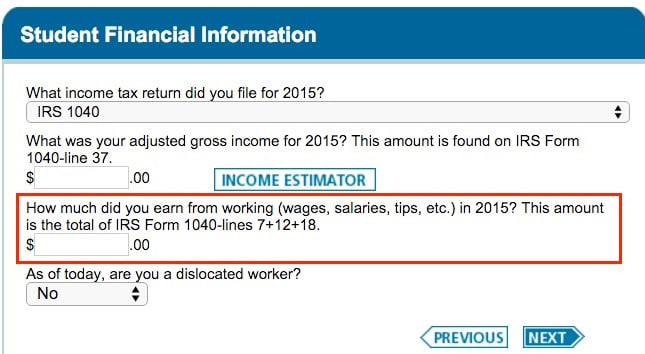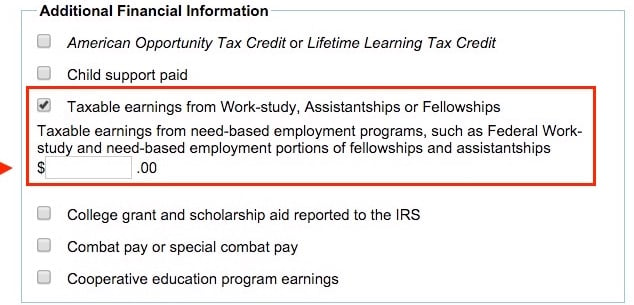How Do I Continue Earning Work Study
Work-study is a federally and sometimes state-funded program that helps college students with financial need get part-time jobs.
It won't cover all your college costs — you'll need a combination of personal savings, scholarships, grants and student loans, too — but it's beneficial for students who qualify.
"Work experience at any level while you're in college is going to be a benefit," says Megan FitzGibbon, manager of state scholarship programs at the Minnesota Office of Higher Education. "Especially if it's related to your degree."
Federal work-study FAQ
-
You have to fill out the Free Application for Federal Student Aid ( FAFSA ) to be eligible.
-
Students are typically responsible for securing their own work-study jobs. Just because your financial aid award says you qualify for work-study doesn't mean you're guaranteed a job.
-
Around 3,400 colleges and universities have a Federal Work-Study Program, according to the U.S. Department of Education, but not all schools do. Check with the financial aid offices at the schools you're interested in to see if they offer work-study.
How to apply for federal work-study
When you fill out the FAFSA , select the box on the application that indicates you want to be considered for work-study. You should fill out the FAFSA as soon as possible because some aid is awarded on a first-come, first-served basis.

Selecting this option doesn't guarantee that a work-study option will be included in your financial aid award, and it doesn't bind you to accepting the work-study if it's offered.
Within a few weeks or months of filling out the FAFSA, you'll get a financial aid award listing the amounts you're eligible to get from loans, grants and work-study. Colleges award work-study funds based on availability of funds, student financial need and other financial aid a student is eligible for.
Although your aid financial aid award letter may list a certain amount allocated for work-study — say, $5,000 — that doesn't mean you automatically get that money. You have to find a work-study-eligible job and then work enough hours to earn that amount.
Do I have to accept work-study aid?
If work-study is on your financial aid award and you don't intend to use it, you can decline the award. However, in most cases, getting a work-study job is a good idea, especially if it decreases your student loan borrowing and the amount of student debt you'll face after graduation.
"We would much rather have our students turn to grants, work-study — any other source of aid — before they turn to loans," says Austin Gentry, admissions advisor at New Mexico State University.
Where to find an eligible work-study job
After you're offered a work-study opportunity, you have to find a job that qualifies for the program.
Many work-study gigs are on-campus and can include research assistantships, administrative duties in a campus office or working in the library. Other work-study jobs may be off-campus at nonprofit organizations or private companies. A portion of work-study positions are community-service jobs, including tutoring, child care and health care.
Many schools have online portals with work-study job listings, and students are encouraged to apply for jobs that are related to their field of study. Work-study jobs promise flexible hours so you can more easily balance work and school.
Typically you can only earn as much through work-study as the financial aid award stipulates, although some employers make exceptions.
For example, if your award allocated $5,000 for work-study, you could work as many hours as it takes to earn that amount. But say you reached that amount with two weeks left in the semester. Some employers may allow you to continue working for the remainder of the semester and exceed your allocated amount, but it depends on the employer, Gentry says.
Average work-study award
With a work-study job, you're guaranteed to earn at least the federal minimum wage, $7.25 an hour. If the state minimum wage is higher, you'll earn at least the state minimum wage.
The average work-study award for a student with an eligible job earned $1,531 in 2022, according to the annual Sallie Mae report "How America Pays for College." One in five (20%) families used work-study as part of an overall strategy to pay for college, the report found.
How does work-study pay?
You can opt to get paid by check or direct deposit, or have the money credited to your school account to cover tuition, fees or room and board. There's no requirement that you use the money for anything specific; FitzGibbon says many students use their work-study paychecks to cover day-to-day living costs.
Does work-study affect future financial aid?
The money you earn through work-study is taxable, and you should report it on your FAFSA the following year in two places. First, include your work-study earnings when you report your total income earned from work that year.

Second, a later question asks how much you earned through work-study the previous year. Fill that out, too, because the money you earn through work-study won't count in the calculation that determines how much aid you're eligible for the following year.

Next steps
Fill out the FAFSA. The application for the 2022-23 school year is available Oct. 1, 2021. If you've already been approved for the work-study program, check with your college for job listings.
Source: https://www.nerdwallet.com/article/loans/student-loans/what-is-work-study
0 Response to "How Do I Continue Earning Work Study"
Post a Comment